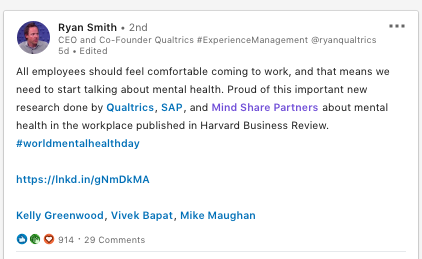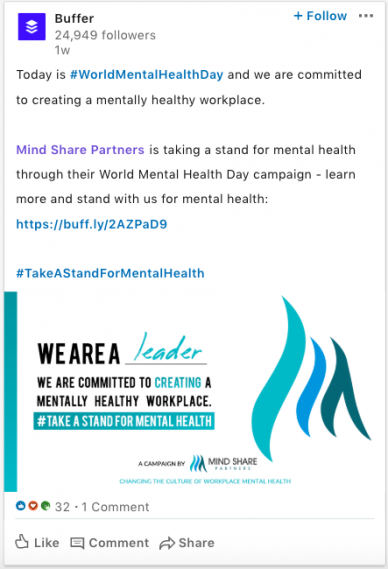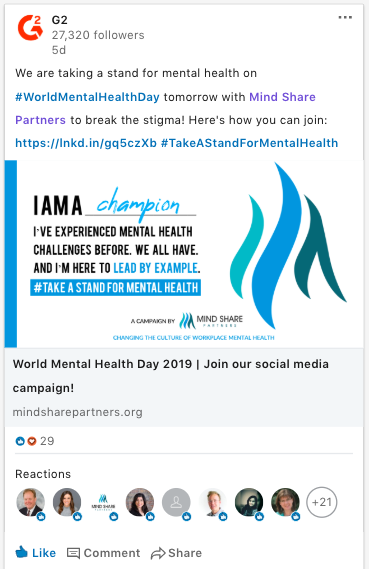- Update 11/22/19: Mental health remains taboo in the workplace, but increasingly, employees are not willing to tolerate it anymore. Research conducted by Mind Share Partners in partnership with SAP and Qualtrics and published in the Harvard Business Review found that 20% of respondents had voluntarily left roles in the past for mental health reasons. 50% of millennials and 75% of Gen Z-ers had left roles for mental health reasons, both voluntarily and involuntarily (compared to 34% of overall respondents).
- Evidence indicates that 80% of the population will experience a mental health condition in their lifetime, yet 60% of employees have never spoken to anyone at work about their mental health status.
- Mental health is becoming a defining issue in the next-generation workplace and the next frontier of DEI. To both attract and retain talent companies must address the stigma in their workplace through culture change, and CEOs play a defining role as culture-setters.
Younger generations are bringing mental health to the forefront of the workplace, demanding both leadership and workplaces to take notice and action. The findings from Mind Share Partners’ Mental Health at Work Report — in partnership with SAP and Qualtrics — sparked conversation nationwide, uncovering strong implications for the workplace, from employees and front line managers to the C-suite.
Employees are prioritizing their mental health over company loyalty—especially when their companies aren’t supporting them.
There is a generational shift in awareness happening when it comes to mental health.
“Mental health, broadly speaking, is something younger generations are used to talking about freely,” Kelly Greenwood, CEO and founder of Mind Share Partners, told CNBC.
“All of a sudden they get into the workplace and they’re not supposed to talk about it,” Greenwood continued.
Part of the shift Greenwood mentions includes millennials and Gen Zers realizing they have options when it comes to their employment. More often, they are choosing to leave a workplace culture that is detrimental to their health.
The millennial generation has already begun to destigmatize mental health support, such as therapy, and will predictably demand similar in the workplace as research suggests that money and work are leading factors contributing to their stress. Still, many employees are unsure if their company offers resources and are not comfortable asking.
In fact, a majority of employees aren’t comfortable talking about mental health at work, especially to senior leaders and H.R. To empower this historically silenced community, Mind Share Partners compiled a comprehensive list of mental health resources available.
Transparency and vulnerability are becoming necessary qualities in a new wave of leadership.

It is widely known that employees spend a great deal of time watching what their boss does, which is why a leader’s behavior is just as, if not more important, than what they say.
“Modeling disclosure and vulnerability as strengths, not weaknesses, goes a long way toward reducing mental health stigma and setting the tone for transparency,” survey researchers shared.
CEOs play a vital role in reducing stigma and empowering employees to use company mental health resources without fear of retribution. Mental health training for all employees, including managers, will predictably become part of standard company training initiatives.
Mind Share Partners launched a social media icebreaker called #TakeAStandForMentalHealth amidst the survey coverage to bring attention to how stigma stifles conversation and treatment-seeking behavior at work. They partnered with a variety of widely known companies who publicly shared their allyship and commitment to a mentally healthy workplace. The campaign reinforced the integral role leaders will play in changing company culture to better support employee mental health.
Two CEOs whose companies participated in the campaign exemplify this new leadership style.

Joel Gascoigne, CEO of Buffer (a leading social media software company), opened up to his team about taking a sabbatical due to severe burnout. This resulted in employees feeling more comfortable opening up about their own mental health, and direct company policy additions at Buffer to support mental health.

The CMO of G2 Crowd ( the world’s largest tech marketplace), Ryan Bonnici, shared in Scientific American why his employees feel comfortable taking a mental health day — he’s done it himself and is transparent about it with his staff.
Mental health is the next frontier of diversity, equity and inclusion (DEI) and needs to be addressed as a standalone DEI issue.

The survey found that historically underrepresented communities and identities in the workplace had higher rates of every mental health symptom compared to all respondents. Research shows that chronic stress caused by discrimination can contribute to mental and physical health problems, which is why it wasn’t surprising when nearly 50% of black and Hispanic participants in the survey reported leaving a job for mental health reasons compared to 32% of white participants.
The mental health repercussions of discrimination also apply to gender and sexual orientation. The study reported that LGBTQ+ employees are more likely to experience mental health symptoms in the workplace than their straight, cisgender peers. In fact, 80% of transgender employees reported their workplace environment contributed to their mental health symptoms, compared to 37% of all respondents, and 90% reported leaving a job in the past due to mental health-related reasons.
The next wave of DEI leaders will find that it’s imperative to address mental health to be able to create true inclusion in their workforces. “Including mental health in DEI strategies is a critical component of enabling people to bring their full selves to work,” Greenwood shared.
Celebrity influences have begun to chip away at stigma. For example, the work of The Boris Lawrence Henson Foundation launched by American actress Taraji P. Henson focuses on eradicating the stigma in the African-American community.
Greenwood shares,
“While I think it’s important that celebrities and actors are coming out discussing their mental health conditions, I think business leaders need to be coming out as well. It needs to be something that’s okay to talk about at work.”
Find the download here for all survey results from Mind Share Partners’ Mental Health at Work 2019 Report.
Correction: November 21, 2019
The original report had a wording error in one of the study’s findings. 50% of millennials and 75% of Gen Z-ers had left roles in the past for mental health reasons, both voluntarily and involuntarily (not just voluntarily).


